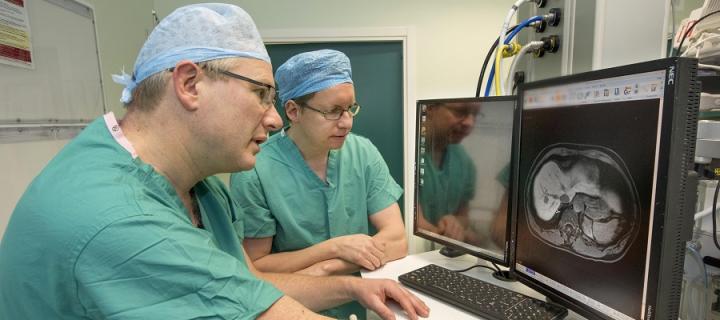Imaging study seeks to boost care for liver cancer patients
Patients facing surgery to remove liver cancers could benefit from a £1.1million initiative that uses advanced imaging technology to improve care.

The imaging study will involve researchers from the University of Edinburgh and Hampshire Hospitals NHS Foundation Trust who will test whether novel MRI scanning techniques can help doctors assess possible risks to patients before liver surgery.
Collaborative research
The study will be led by Mr Damian Mole, MRC Senior Clinical Fellow and Honorary Consultant Liver and Pancreas Surgeon and Dr Jonathan Fallowfield, NRS Senior Clinical Fellow and Honorary Consultant Hepatologist; both of Edinburgh Medical School. It will entail collaborative work involving clinical teams, research nurses, imaging specialists and medical physicists.
Assessing risks of surgery
The non-invasive technology can provide a detailed picture of liver health to help the multidisciplinary surgical team assess the risks of major liver surgery. It can also help track the effect of chemotherapy and gauge the health of a regenerated liver after surgery.
Surgery is the most effective treatment for liver tumours. Doctors typically remove the section of the liver that is affected by cancer and leave the remainder of the organ intact. The remaining part of the liver needs to function well enough for the patient to survive after surgery until the liver can regenerate back to full health.
Rising rates of liver cancer
Some 1600 operations are performed in the UK each year and rates worldwide are rising faster than for any other cancer. Previous research into surgical complications has identified poor liver health – caused by pre-existing chronic liver disease – as a key contributor to post-op liver failure.
We believe that these techniques can measure liver health prior to surgery and therefore contribute to a more accurate assessment of surgical risk. Ultimately, we hope this enabling technology will significantly improve the safety of patients who undergo surgery
New technology developed
The project – called HepaT1ca – involves the University of Edinburgh and Hampshire Hospitals NHS Foundation Trust. They work with University of Oxford spin-out company Perspectum Diagnostics, which has developed the technology called LiverMultiScan™.
The system can safely and accurately identify poor liver health caused by excessive fat, inflammation, scar tissue or high iron content. Funding to investigate how the technology can be integrated into patient care has been awarded by Innovate UK, a Government-backed initiative that reports to the Department for Business, Energy and Industrial Strategy (BEIS).
By teaming up with Perspectum Diagnostics, we can test whether this novel technology can be applied in real life clinical practice. The aim is to advance the MRI technology behind LiverMultiScan™ to support surgical planning in clinical practice
The initiative is backed by Sunergos Innovations – formerly the BioQuarter Commercialisation Team – which supports the University of Edinburgh to translate medical innovation into better health outcomes for patients.
Related links

